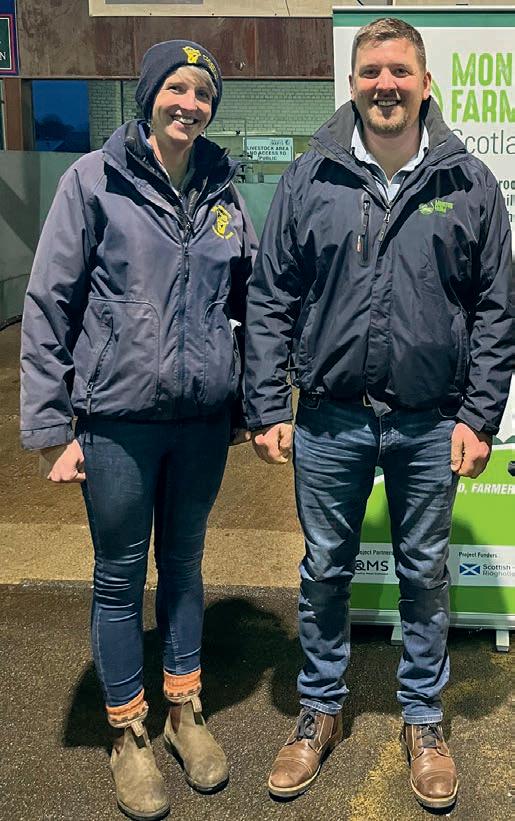Essayer OR - Gratuit
Care needed with supplementary colostrum to avoid 'unintended consequences'
The Country Smallholder
|Spring 2025
With many smallholders lambing season fast approaching, new on-farm research is highlighting the serious 'unintended consequences' of poor colostrum storage and equipment hygiene.
-

The research was carried out during last year’s lambing on a typical commercial flock by the University of Glasgow and Monitor Farm Scotland programme. It discovered that 80% of the farm’s supplementary colostrum tested failed total bacterial count tests.
High bacterial counts cause a number of serious issues, explains Ali Haggerty, a vet with The Stewartry Veterinary Centre in Castle Douglas, Dumfriesshire. “Remember lambs have no antibodies of their own at birth and are reliant on the transfer of antibodies from maternal colostrum across the gut to gain immunity to disease in the first few weeks of life.
“Bacteria can inhibit the transfer of passive immunity to the lamb, can break up the antibodies in colostrum rendering them ineffective, and block the uptake of antibodies across the lamb’s gut. They can also damage the gut itself meaning antibodies can no longer cross, and, of course, can cause disease in their own right.”
When looking at coliforms, the bugs that can be particularly responsible for the deleterious effects on colostrum and are associated with faecal contamination, the research found 60% of samples on farm exceeded acceptable thresholds.
While the results may seem shocking, bacteria can quickly multiply, she explains. “Bacteria grow exponentially and can double their population very, very rapidly. Colostrum left at ambient temperature—like you might find sitting in a container or feeding equipment in the lambing shed while you’re busy working around the pens—offers both the optimal temperature and nutrients that speeds up bacterial growth by shortening their doubling time.
“As an example, bacteria like E.coli can have a generation time of 20-30 minutes, so if we start with, say 1,000 bacteria, the population could increase to 2,000 in 20 minutes, 4,000 in 40 minutes and 8,000 in an hour and so on,” she adds.
Cette histoire est tirée de l'édition Spring 2025 de The Country Smallholder.
Abonnez-vous à Magzter GOLD pour accéder à des milliers d'histoires premium sélectionnées et à plus de 9 000 magazines et journaux.
Déjà abonné ? Se connecter
PLUS D'HISTOIRES DE The Country Smallholder

The Country Smallholder
Preventing and Controlling Predators
Poultry are prey animals and, in the UK, there are a wide array of predators that can hunt them. Hugh and Fiona Osborne look at the predators to be aware of and how to guard against them.
7 mins
December 2025

The Country Smallholder
Showing our Turtle Doves some love this Christmas
Helen Moffatt says you can be part of Operation Turtle Dove on your smallholding
3 mins
December 2025

The Country Smallholder
On the third day of Christmas
The famous Christmas carol celebrates \"three French hens\", but what if we gave the verse a smallholder's twist? Cara Wheeldon introduces three festive bantam breeds that bring sparkle, charm, and cheer to coops across Britain this winter.
5 mins
December 2025

The Country Smallholder
Five ideas for inside food growing over winter
Editor and eco-expert Kim Stoddart outlines some more creative ways to bring the outdoors in this winter
3 mins
December 2025

The Country Smallholder
How to enjoy winter pig keeping
Linda Aldous says success is all in the preparation and in your clothing!
5 mins
December 2025

The Country Smallholder
Where next for Britain's smallholding and farming communities as we look to 2026 and beyond
Agricultural journalist, smallholder and editor of Ford & Fordson Tractors Magazine Jane Brooks, joins us for her regular look at the world.
4 mins
December 2025

The Country Smallholder
All dressed up with nowhere to show?
Grant Brereton says there's still cause for optimism with pure breeds
6 mins
December 2025

The Country Smallholder
When small businesses collaborate, things happen!
Angela Williams shows how by working with like minded people, you can create things you thought you could only dream
5 mins
December 2025

The Country Smallholder
Cluckin' around the Christmas tree
'Tis season of peace and goodwill to all hens
5 mins
December 2025

The Country Smallholder
The gentle giant Brahma - big and beautiful
Victoria Roberts BVSC MRCVS looks at a stately, docile chicken with an impressive history
2 mins
December 2025
Listen
Translate
Change font size

